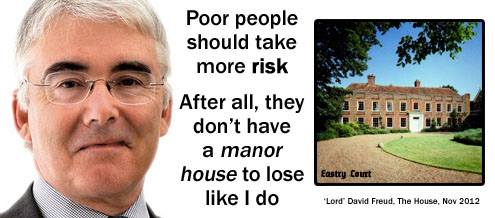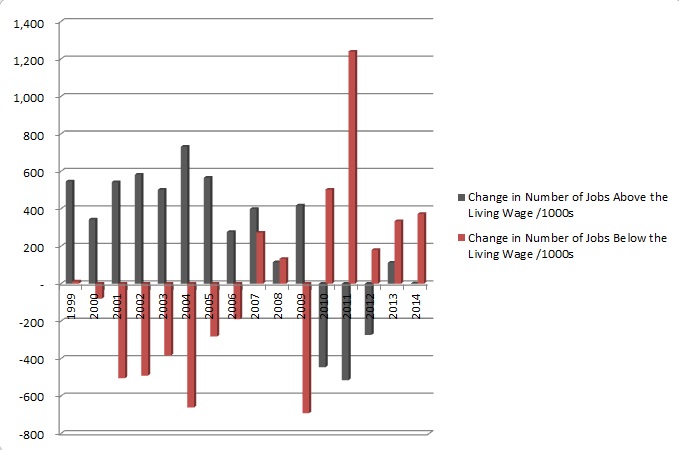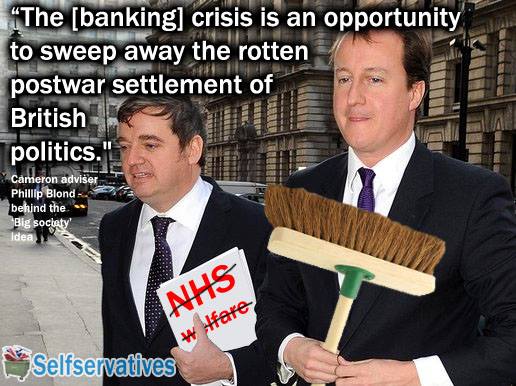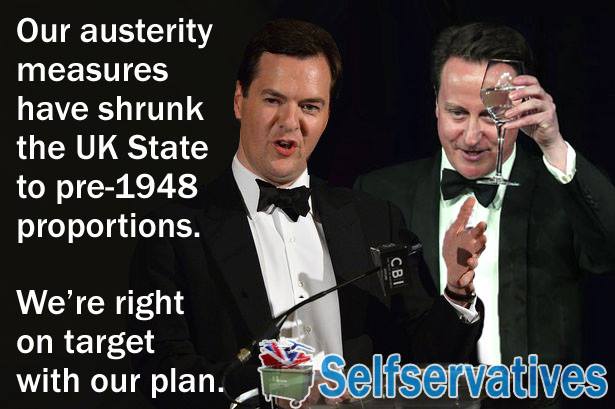
.
It’s taken just four years since Labour’s Equality Act was implemented for it to appear reasonable for a government minister to propose that disabled people have fewer rights and are of less worth than everyone else. Only a corporocratic Tory would call exploiting disabled people for profit “support” and try and make out they are doing us a favour.
The Tories have made a virtue out of claiming they are giving something by taking something away. For example, the welfare cuts have been casually re-named reforms in true Orwellian style. We have yet to see how cutting the lifeline benefits of the poorest people, and imposing harsh sanctioning can possibly be an improvement for them, or how it is helping them into none-existent work, in a time of inflated living costs and recession.
This said, even the Tories have been forced to distance themselves from David Freud’s “business-friendly” Tory commentary, about the lower economic worth of disabled people.
Anyone endorsing Freud’s comments should perhaps try substituting the word “disabled” with “woman” or “gay” or any ethnic group and see how far they get with that.
We do have laws that demand people are treated equally, regardless of their characteristics, and for good reason, especially when people commenting on this issue think it’s ever acceptable to discriminate against disabled people. But then there’s also the issue of basic decency, and of what a civilised society allows and doesn’t allow. It’s telling that the loudest of defences for Freud’s blatantly discriminatory remarks came from the Adam Smith Institute, who would have everyone on less than the minimum wage if they had their “all hail the competitive, managed free-market” minarchist way.
The real hypocrisy of Libertarians is that they know that the invisible hand of the market goes hand in hand with the iron fist of the state, in their rigged game. Indeed, politically the idealised neoliberal small state has not disengaged from the public domain but its authoritarian arm has been extended.
Under the guise of a “new paternalism” (much the same as the old Tory 19th Century paternalism), which reduces the social world to the theories of behavioural economics and narrow neoliberal outcomes, the Tories have aligned public values with tradition – legitimated by a claimed concern for the welfare of society – but in reality it’s clear that Conservative paternalism is and always has been shorthand for hierarchical societies based upon privilege and a rigid control over the mass of people’s freedom, responsibilities (to the state), wellbeing and opportunities.
This is simply a social control mechanism with its micro-managerial politics; the tendency for politicians to devolve not power but responsibility for decision-making to citizens, without any reference to human experiences, constraints, or either micro or macro-level circumstances. And without extending genuine choices. It’s as if we have been placed in a state of perpetual Tabula rasa. The government and media re-write our narratives upon us.
Its also a preposterous zero-sum approach to wealth distribution. For the Tories, inequality is seen as necessary and beneficial.
State interventions this past four years have ensured that only the poorest and most vulnerable are left to the mercy of market forces, whilst welfare, in any meaningful sense, applies only to the wealthiest. Whilst austerity has been inflicted on the most vulnerable citizens in our society, the millionaires have enjoyed tax breaks and increased salaries. The elite play a rigged game: lobbying, the revolving doors between business and politics, being above the law, and tax-payer funded bailouts. The free-market isn’t open to the poor.
True laissez-faire capitalism is left for imposition only for the most vulnerable citizens, and only after we have been squeezed dry by those lying, pro-interventionist minarchists, who ensure that all protective, supportive public provision has been removed, and the public services we depend upon have been plundered and then sold off to the ever-circling private business and capitalist class vultures.
My point is this: the Tories, as neoliberal fundamentalists, have supplanted collective, public values with individualistic, private values of market rationality. They have successfully displaced established models of welfare provision and state regulation through policies of privatisation and de-regulation and have shifted public focus, instigating various changes in subjectivity, by normalising individualistic self-interest, entrepreneurial values, and crass consumerism. And increasing the social and material exclusion of growing numbers living in absolute poverty.
Basically, the Tories tell lies to change perceptions, divert attention from the growing wealth inequality manufactured by their own policies, by creating scapegoats and stigma.
Freud’s comments have reduced disabled people’s worth to their economic value. Just as all Tories conflate everyone’s worth to an economic value. Human needs are being conflated to narrow neoliberal outcomes.
And they do tell such lies to justify their policy interventions.
For example, Disability Living Allowance (DLA) allows disabled people to purchase home adaptations, medication, treatment and equipment themselves. It is a very modest benefit of around £70 a week, it saves the taxpayer money because it allows early intervention, preventative treatment and, most importantly of all, it allows disabled people to work.
In fact the majority of DLA claimants were in work and use the extra cash to pay for the transport, software, screen readers, tactile keyboards and orthopaedic chairs, and so forth, thus allowing more and more disabled people to do a 9 to 5 job.
Yet the Chancellor said, in his 2010 emergency budget speech, that the Tory instigated reassessments for DLA would “significantly improve incentives to work“, despite the fact that DLA has nothing whatsoever to do with unemployment.
“BRITAIN’S shirkers’ paradise shame with hordes of work shy benefit claimants was blamed last night for much of our economic mess…
…we have managed to create a block of people in Britain who do not add anything to the greatness of this country. (Now THAT is a typified Tory view)
They have become conditioned to be users of services, not providers of money. This is a huge part of the reason we have this massive deficit. We have had to borrow vast sums of money. We went on this inflated spending spree” – More lies from Iain Duncan Smith, in The Sun, 1 December 2010, despite an official rebuke from the Office for National Statistics.
Duncan Smith has somehow forgotten that the global banking crisis is responsible for the recession, not poor people without jobs, and as for the lies about New Labour’s “big spending” Fabianism, which has no empirical basis, it’s worth noting that total public spending under the Thatcher Governments averaged 42.11 per cent of GDP and, under the Blair Governments, 36.59 per cent (Source: HM Treasury, 2010).
The Access to Work fund was re-established by the last Labour Government to ease the transition to work for disabled people, by paying grants to businesses for vital equipment. It was put in place to support people with disabilities, it aimed to reduce inequalities between disabled people and non-disabled people in the workplace by removing practical barriers to work. This fund has seen severe cuts since 2010, which flies in the face of this Government’s claim to “make work pay” for all. By reducing this essential funding, the Coalition have effectively excluded many from work.
Additionally, disabled people with the highest support needs have been left in fear and distress following the Government announcement that it is to callously abolish a key source of independent living support. The Government decision to close the Independent Living Fund and devolve responsibility to severely under-funded local authorities follows a consultation that disabled people claim is unlawful and on which an urgent hearing scheduled by the High Court to go ahead on 13/14 March 2013.
Labour have also challenged the decision to close this crucial source of support. Labour has called for the retention of this vital fund which benefits the most severely disabled. To show her support for the retention of Independent Living Fund, which is relied upon by over 19,000 severely disabled, Labour’s Dame Anne Begg is the primary sponsor of an Early Day Motion calling on the Government to reverse their decision to close the fund in June 2015. You can view the EDM here.
In May 2014, the Court of Appeal, in the case of Bracking and others v Secretary of State for Work and Pensions found that the Department of Work and Pensions’ decision to close the Fund was not lawful, overturning a High Court decision of April 2013. It decided that the Department had not complied with the Public Sector Equality Duties imposed by section 149 of the Equality Act 2010. Opportunity for new applications for this funding was closed in June 2010 by the Coalition. Once again this plainly indicates that the Coalition do not consider the needs of disabled people as important, and clearly demonstrates the extent of their disgustingly eager ideological drive to strip away essential provision and support for the vulnerable.
As Sir Bob Hepple QC has pointed out, some provisions of the Labour Government’s Equality Act were very quietly edited by the Coalition, (only roughly 90% of the Act came into force, after the Coalition quickly said it would be “reviewing several sections of the legislation passed by parliament in April 2010,”) whilst other provisions have been repealed by the Enterprise and Regulatory Reform (ERR) Bill, including the duty on public authorities to have due regard to the need to reduce socio-economic inequalities.
The failure to implement the Act in full certainly sends out a clear signal that creating a more equal society is not priority for the Coalition. However, perhaps even more important has been the Conservative defense of increasing economic inequality, the lionisation of a Randian selfish individualism and a proliferation of ideological justification narratives regarding the dismantling the “Big (Welfare) State”, where the latter, in Orwellian fashion, is now being indicted for many of the very social and economic ills that the free-market era has actually delivered.
Ed Miliband is right to demand Freud’s resignation, and right to defend our vulnerable citizens from potential exploitation: that is not “playing politics” as claimed by the likes of Paul Staines and James Delingpole, Freud was certainly not a victim in this.
To put this in context, the Labour Party introduced a host of measures to strengthen the rights of disabled people. They passed the Disability Discrimination Act 2005, introduced the Equality Act 2010, and formed the Equality and Human Rights Commission, and, in 2009, the Labour government signed the United Nations convention on the rights of persons with disabilities.
Kate Green and Anne McGuire have pointed out that the original intentions when Labour introduced the Employment Support Allowance (ESA)pilot and an assessment of people’s capacity for work, have been distorted – that the original aim was to be a supportive and facilitative process, with Disability Living Allowance (DLA), and other supportive measures in place to help people with disability lead a dignified life, fulfilling their potential, but, as Anne McGuire has pointed out, the renegotiation of the Atos contract by the current Government, (along with the addition of targets to remove people’s benefits, and sanctions,) has rebalanced the system to be punitive, rather than facilitative.
Of course the Tories have been very quick to blame Labour for the current situation, however, following a review of their pilot, Labour warned the government of problems with the Work Capability Assessment (WCA), which Iain Duncan Smith duly ignored, passing the ESA system into law, making the WCA even more problematic, and as stated, re-contracting Atos “in line with the welfare reforms”, including targets to take people’s lifeline benefits away, despite the claims made by the Tory liars.
Comparing policies indicates clearly the stark differences between the parties, and given the briefing from Labour from their ESA review that was blatantly disregarded, and the refusal of the Coalition to undertake a cumulative impact assessment of the “reforms”, it’s clear that the Tories do not regard the poorest and most vulnerable worthy of government diligence, accountability, support and fair treatment.
We simply cannot allow such a vindictive, uncivilised government another five years to harm our most vulnerable citizens, further undermine our democracy, destroy our public services and welfare provisions and trample our human rights. This is the first government to face a United Nations inquiry into disability rights violations. And that is absolutely shameful for a wealthy so-called first world liberal democracy.
Never in this country have those who fight for democracy and social justice carried a greater burden or faced the possibility of bigger losses of human rights, human freedoms, human dignity and human welfare than they do right now.

Pictures courtesy of Robert Livingstone








